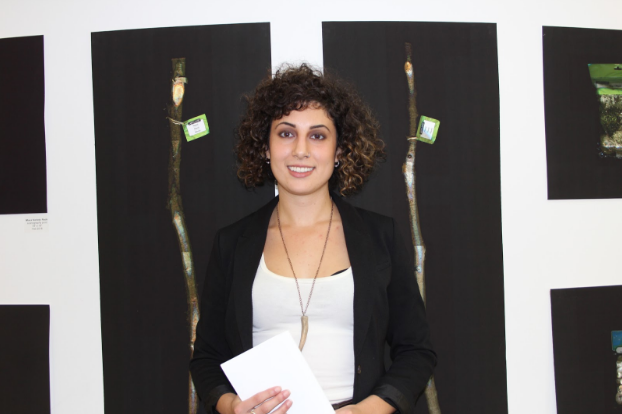Art
Exposing industry’s unnatural relationship with nature
'There was something almost poetic about returning the objects stolen by these companies'

caption
Najet Ghanai is an interdisciplinary artist who is asking questions about society’s possessive relationship with nature.
“I’ve always been fascinated with how we try to keep the outdoors outside and the indoors clean,” she says.
After completing a mentorship with the Halifax StART Festival this March, Ghanai was a feature artist at last month’s Prismatic Arts Festival, where she debuted her installation, TransPlant – Nature Vs. Industry, at the Halifax Central Library.

caption
Najet Ghanai after her talk at last month’s Prismatic Arts Festival.The NSCAD University graduate’s installation featured blown-up photographs of natural items, such as moss and sticks, which had been switched with the identical craft items from the store and placed in the packages to be returned. Ghanai says that she sees her work as a visual research project.
This year’s festival notably featured an all-women lineup. Ghanai says that she felt fortunate to have been a part of it.
“Wouldn’t it be such a beautiful moment if it (happened) all by accident? If it was just that (Shahin Sayadi, the Artist Director) was going around seeing work that he liked, and then was like, ‘Woah, what are the chances of that?’”
Kelsey MacDonald, the producer of Prismatic Festival, Canada’s only multi-arts festival featuring culturally diverse and aboriginal artists, went to junior high with Ghanai in Halifax. She was delightfully surprised when she heard that Ghanai was selected as a festival artist.
MacDonald says that Ghanai’s installation was striking for many reasons, but especially because MacDonald used to work at the same craft store where Ghanai shopped to create the installation.
“I know the actual cost in manufacturing those (natural) items and it’s pennies compared to what they charge for them,” says MacDonald.
The making of TransPlant
Ghanai has been working on the installation since 2012, while she was in her third year of the bachelor of fine arts program at NSCAD. The concept stemmed from her interest in “the strangeness of certain things that can be bought and sold at stores.”
Ghanai originally displayed TransPlant – Nature Vs. Industry as a work-in-progress in March as part of the 2016 Halifax StART Festival. She was given $100 as part of a larger grant with the festival, which she used to purchase natural items from stores in Halifax.
“I just walked around large craft stores and the dollar store – places that are known for having a lot of waste or useless items. I then found this whole aisle that (sold) sticks and branches and seashells, rocks, moss, lichen – all of this stuff that is obviously really easy to come by in Nova Scotia.”
The fact that people would buy natural items easily found around the province was shocking to her – so she bought $100 worth of them. Ghanai then foraged for identical natural items to the ones that had been sterilized, packaged and sold. She was able to match every item she purchased by wandering around places like Point Pleasant Park and Conrad’s Beach.
“What I’m showing is more proof of what happened, rather than the art itself – because the art finished the day I took my sales receipt back with all of the stuff I found in the woods and returned them and got my $100 back,” says Ghanai.
She documented all of this through photos and extensive note-taking, in addition to blowing up the craft store receipt that she kept to prove that the switches had taken place.
“I think the blown-up receipt is amazing, it almost has this forensic quality and the scale of it,” says Anna Sprague, a NSCAD professor who mentored Ghanai in the spring.
She refers to Ghanai as an activist as well as an artist. Sprague sees TransPlant – Nature Vs. Industry as a commentary on capitalism as it relates consumerism and consumption of natural resources, “with a little twinge of antagonism.”
Sprague thinks that the installation contemplates complex issues of colonialism, such as ownership, entitlement and access to the land and its natural elements.
“I like when things are sneaky and rather than solving (problems), TransPlant is asking more questions,” says Sprague.
Reflecting on the project’s message
“There was something for me, almost poetic, about returning the objects that were stolen by these companies,” says Ghanai.
Ghanai acknowledges that in TransPlant – Nature Vs. Industry, she walks a fine line between imitating the acts of pillaging of the land, as the craft store suppliers did, and making a point about the harm and greed associated with packaging and selling nature.
While foraging for items, Ghanai also found that there were interesting power dynamics at play, related to accessibility and class privileges, that she experienced.
“Not everyone can get into a car and drive to Conrad’s beach like I did and walk along the uneven footing with rocks and the tide coming in,” says Ghanai.
“The other thing is that, having time to make DIY projects that these craft companies market is also a privilege.”

